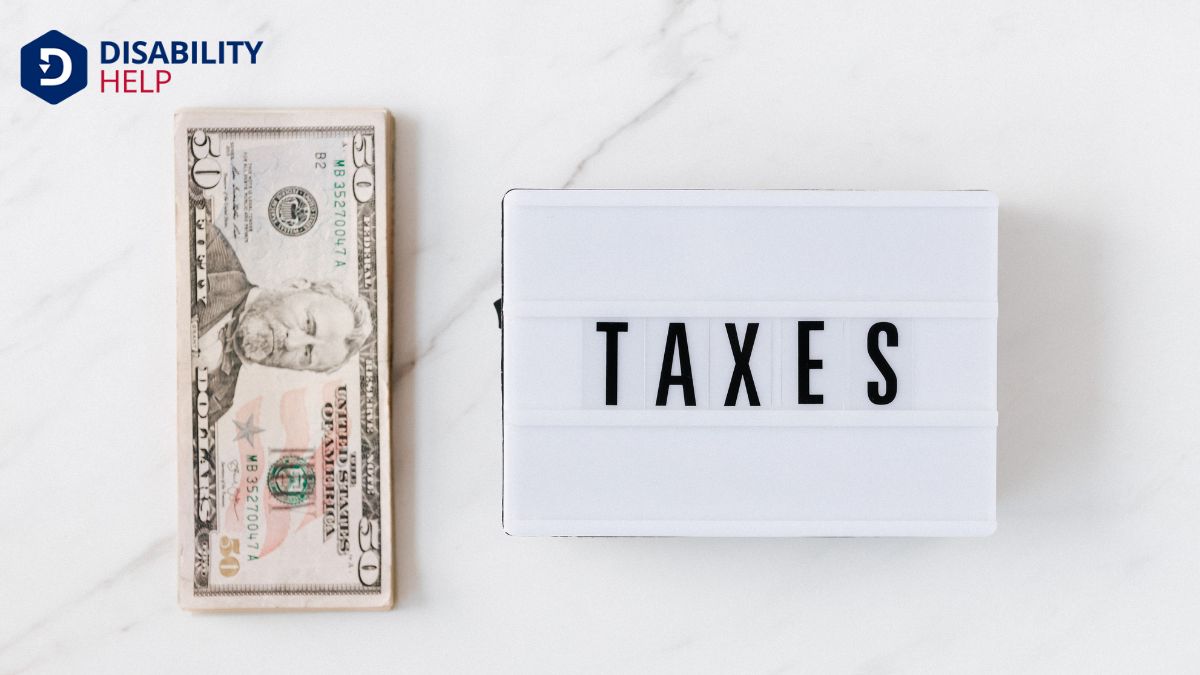When it comes to disability insuranceA form of insurance that provides income to individuals who are unable to work due to a disability. benefits, the question of taxability can often leave us scratching our heads. Are these benefits taxable? It depends on several factors, including who pays the premiums and how they're paid. Employer-provided plans and privately purchased policies each have different tax implications, and state regulations can further complicate matters. Let's explore these factors and uncover what they mean for your financial planning.
Key Takeaways
- Employer-paid disability insurance benefits are generally taxable income for the employee.
- Benefits from policies with after-tax premiums are typically tax-free.
- Mixed premium contributions result in partial taxability based on the after-tax portion.
- Self-employed individuals' benefit taxability depends on whether premiums were pre-tax or post-tax.
- State-specific regulations and income thresholds can affect the taxability of disability benefitsFinancial assistance provided to individuals who are unable to work due to a disability, such as Soc....
Understanding Disability Insurance

Disability insurance can seem complex at first, but let's break it down together. It’s designed to replace a portion of our income if an illness or injury prevents us from working. Fundamentally, it’s a financial safety net.
We often encounter two main types: short-term and long-term disability insurance. Short-term covers us for a few months, while long-term can extend for several years or until retirement.
Understanding our policy details is vital. What's our coverage amount? What’s the waiting period before benefits kick in? These are key questions we need to explore.
Taxability of Employer-Provided Disability Insurance
When we consider the tax implications of employer-provided disability insurance, the key factor is who pays the premiums.
If our employer covers the premiums, the benefits we receive are typically taxable.
However, if we pay those premiums with after-tax dollars, our benefits are generally tax-free.
Employer Tax Contribution Impact
As we explore the taxability of employer-provided disability insurance, it's vital to understand how employer tax contributions impact this benefit. When an employer pays the premiums for disability insurance, any benefits we receive become taxable income. This means that if we ever need to claim these benefits, they'll be subject to federal income tax.
Fundamentally, the tax responsibility shifts from the employer to us when benefits are distributed.
It’s important to remember this distinction because it affects our financial planning. If we anticipate needing disability benefits, knowing their taxable status helps us prepare for potential tax liabilities.
Clearly understanding this aspect allows us to make informed decisions about our coverage and anticipate the financial implications should we need to rely on these benefits.
Employee-Paid Premium Considerations
One essential aspect of disability insurance is understanding how employee-paid premiums affect the taxability of benefits.
When we pay our disability insurance premiums with after-tax dollars, the benefits we receive are typically tax-free. It’s vital to reflect on this when choosing our policy options.
Here’s how it works:
- After-Tax Premiums: If we pay the premiums with after-tax income, benefits aren't taxable, allowing us to keep more of what we receive.
- Pre-Tax Premiums: Paying premiums with pre-tax dollars means the benefits are taxable, impacting our net income.
- Mixed Contributions: If premiums are split between employer and employee, only the portion we pay with after-tax dollars is tax-free.
Tax Implications of Employer-Paid Premiums
When our employer pays the premiums for disability insurance, it impacts how the benefits are taxed.
If the employer covers the entire cost, the benefits we receive are typically taxable income.
Understanding this connection helps us better prepare for the tax implications of any future benefits we might collect.
Employer Premium Tax Treatment
Though it may seem complex, understanding the tax treatment of employer-paid disability insurance premiums is essential for both employers and employees. When an employer pays the premiums, the tax implications can affect both parties.
Here are three key points to evaluate:
- Tax Deductibility: Employers can typically deduct the cost of premiums they pay as a business expense. This deduction reduces the company’s taxable income.
- Employee Income: Employees usually don’t report employer-paid premiums as income on their tax returns, meaning they don't pay taxes on these premiums.
- Plan Ownership: If employers pay the full premium, they own the policy. This can influence decisions about the coverage and terms offered to employees.
Understanding these points helps us navigate the complexities of employer-paid premiums effectively.
Impact on Benefit Taxability
Since the way disability insurance benefits are taxed can greatly impact our financial planning, it's important to understand the tax implications when employers pay the premiums.
If our employer foots the bill for our disability insurance, the benefits we receive during a disability might be taxable. This happens because the premiums were paid with pre-tax dollars, meaning taxes weren't deducted upfront. Consequently, when we receive those benefits, the IRS views them as taxable income.
However, if we pay the premiums ourselves using after-tax dollars, the benefits are typically tax-free. Understanding this distinction helps us prepare for any potential tax liability.
It's important to review our plan details and consult a tax professional to fully grasp how these rules apply to our situation.
Tax Treatment of Employee-Paid Premiums
Employee-paid premiums for disability insurance can have specific tax implications that are important for us to understand.
When we pay these premiums with after-tax dollars, the benefits we receive are generally tax-free. This can be advantageous, as it means more money stays in our pockets during times of need.
Here are three key points to remember:
- After-Tax Premiums: If we pay premiums using after-tax dollars, benefits received are typically non-taxable.
- Tax-Free Benefits: Since we've already paid taxes on the money used for premiums, the IRS doesn't tax the benefits.
- Employer Contributions: If our employer contributes to the premiums, the portion of benefits related to those contributions might be taxable.
Understanding these nuances helps us make informed decisions about our disability insurance plans.
Privately Purchased Disability Insurance Policies
When we opt for privately purchased disability insurance policies, we gain greater control and flexibility over our coverage compared to employer-sponsored plans.
We decide on the policy terms, such as benefit amounts and waiting periods, tailoring them to our specific needs.
An important aspect to contemplate is the tax implication of these benefits. Since we pay premiums with after-tax dollars, any benefits we receive from these policies are generally tax-free.
This means that if we need to file a claim, the financial support we receive won’t be reduced by taxes.
It’s essential to read through our policy details so we fully understand the terms and benefits.
Tax Considerations for Self-Employed Individuals
For self-employed individuals, understanding the tax implications of disability insurance is essential to effectively manage our finances.
We need to evaluate whether premium payments are made with pre-tax or post-tax dollars, as this affects the taxability of benefits.
Let's break it down:
- Pre-tax premiums: If we pay premiums with pre-tax dollars, any benefits received may be taxable. This usually applies if we deduct premiums as a business expense.
- Post-tax premiums: When premiums are paid with post-tax dollars, the benefits we receive are generally tax-free.
- Mixed payments: If we use both pre- and post-tax dollars for premiums, the portion of benefits associated with pre-tax payments will be taxable, while the remainder will not.
Understanding these points helps us make informed decisions about our disability insurance strategy.
Tax Consequences of Partial Disability Benefits
Although traversing the tax implications of partial disability benefits can be complex, understanding them is vital for effective financial planning.
Let's break it down together. When we receive partial disability benefits, the taxability primarily depends on who paid the premiums for our policy. If we paid the premiums with after-tax dollars, the benefits we receive are generally tax-free. However, if our employer paid the premiums or if we used pre-tax dollars, the benefits might be taxable.
It's important to examine our specific policy details and consult with a tax professional to guarantee we're compliant and maximizing our financial strategy.
State Tax Regulations on Disability Benefits
Understanding the tax implications of partial disability benefits sets the stage for examining how state tax regulations affect these benefits. Each state has its own rules, and we must be mindful of these differences.
Let’s consider the following factors:
- State-Specific Taxes: Some states may tax disability benefits, while others don’t. It’s essential for us to verify our state’s tax laws.
- Income Thresholds: Certain states impose taxes based on income levels. We need to know if our benefits push us above any thresholds.
- Exemptions and Deductions: Many states provide exemptions or deductions for disability benefits. Checking if we qualify can lower our taxable income.
Planning for Disability Insurance Tax Obligations

As we navigate the complexities of disability insurance tax obligations, it’s crucial to proactively plan for potential liabilities. We must first understand how our policy was funded. If our employer paid the premiums, our benefits may be taxable. Conversely, if we paid the premiums with after-tax dollars, the benefits are usually tax-free. Knowing this helps us anticipate our tax responsibility.
Next, let's set aside a portion of our benefits for taxes. Estimating our tax rate and saving accordingly can prevent surprises when filing. Consulting a tax professional can offer personalized guidance and guarantee compliance with current laws.
Staying informed and prepared helps us effectively manage our financial responsibilities, providing peace of mind during challenging times.
Conclusion
In summary, understanding the tax implications of disability insurance benefits is essential for effective financial planning. We should remember that employer-paid premiums often lead to taxable benefits, while employee-paid premiums with after-tax dollars typically result in tax-free benefits. For self-employed individuals, the situation varies based on how premiums are paid and state regulations. By staying informed and planning accordingly, we can better navigate the complexities of disability insurance tax obligations and safeguard our financial well-being.






